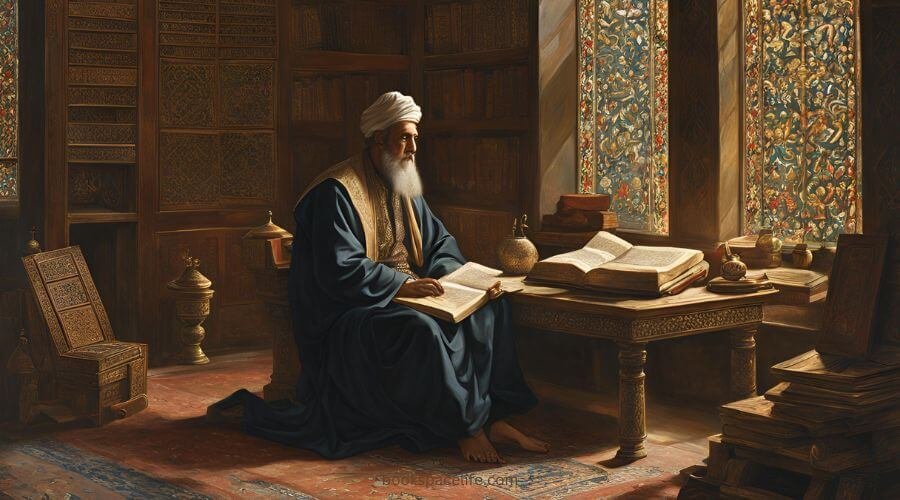Philo of Alexandria
Al-Razi (Rhazes): The Pioneering Philosopher, Scientist, and Physician
Abu Bakr Muhammad ibn Zakariya al-Razi (1150 – 1210 CE), better known in the West as Rhazes, was one of the most influential figures in medieval Islamic philosophy and science.
Born in the 9th century, his work spanned a variety of disciplines, from medicine and chemistry to philosophy and theology.
A polymath, al-Razi’s contributions to both the scientific and intellectual spheres have had a lasting impact, influencing not only medieval Islamic thought but also the development of European science and philosophy in the Renaissance and beyond.
His innovative ideas, particularly in the fields of medicine, alchemical theory, and ethics, made him a towering figure in the intellectual world.
Table of Contents
(1) Early Life and Education
Al-Razi was born around 865 CE in Rayy, a city located near modern-day Tehran, Iran. Little is known about his early life, but it is believed that he came from a prosperous family.
He was initially drawn to the study of philosophy and the arts, but he soon turned his attention to medicine after studying under prominent physicians in Baghdad, the intellectual center of the Islamic world at the time.
Rhazes had a profound passion for learning, and his educational journey was marked by his insatiable curiosity and commitment to intellectual rigor.
He studied not only Greek and Persian medical texts, which had been translated into Arabic, but also texts from a variety of cultures, absorbing knowledge from Indian, Greek, and Persian medical traditions.
He was greatly influenced by the works of Hippocrates, Galen, and the Aristotelian tradition, yet he was not content with merely following the ideas of others.
Instead, he sought to integrate and build upon them, conducting his own experiments and observations to develop original insights.
Al-Razi’s commitment to critical thinking and skepticism was evident in his early education. He was drawn to a scientific approach that emphasized experimentation and observation over reliance on ancient authorities.
His approach laid the foundation for much of his later work, particularly in medicine and chemistry.
(2) Medical Career and Contributions to Science
Al-Razi’s reputation as a physician and scientist grew rapidly, and he eventually became the chief physician at the Baghdad hospital, one of the most famous hospitals in the Islamic world at the time.
His medical writings reflect his deep knowledge of anatomy, pharmacology, pathology, and surgery, as well as his ability to apply the scientific method in practical settings.
Among his most significant contributions was his systematic approach to diagnosis and treatment, which emphasized careful observation, experimentation, and the use of clinical trials.
He was one of the first to differentiate between measles and smallpox, pioneering a method of diagnosis based on the observation of symptoms.
This insight revolutionized the medical field and became a fundamental part of the medical curriculum in both the Islamic world and Europe for centuries.
Another groundbreaking achievement of Al-Razi’s medical career was his work on chemistry and alchemy.
He was one of the first to distinguish between alchemy and chemistry, seeing the latter as a more systematic and scientific approach. His efforts to isolate chemical substances and his exploration of distillation techniques laid the foundation for modern pharmacology and medicine.
He is often credited with the first use of alcohol in medical treatments, including the use of alcohol-based antiseptics for cleaning wounds.
Al-Razi’s most famous medical work is the Kitab al-Hawi, an encyclopedia of medicine that compiled much of the knowledge of the time, as well as his own observations.
The text was widely read and influential, contributing to the development of medical practice in both the Islamic world and Europe.
His detailed work on drug preparations and treatment methods made him one of the most respected figures in the history of Islamic medicine.
(3) Philosophical and Ethical Views
While Al-Razi is most famous for his medical and scientific achievements, his philosophical and ethical views were also deeply influential.
He was an outspoken critic of dogmatic thinking in both philosophy and religion, arguing for the primacy of reason and empirical evidence over faith-based belief systems.
In his philosophical writings, he critiqued the reliance on Aristotelian logic, calling for a more pragmatic and experimental approach to understanding the world.
Al-Razi’s philosophical stance was heavily influenced by his interest in empiricism and rationalism, which led him to reject the supernatural in favor of a naturalistic worldview.
He believed that reason and scientific inquiry were the best tools for understanding the mysteries of existence.
In his famous work Al-Mulakhkhas fi al-Hikma (The Summary of Philosophy), he sought to reconcile the ideas of Greek philosophy with the scientific knowledge of the Islamic Golden Age.
One of his most significant contributions to Islamic philosophy was his critique of theological dogma.
Al-Razi was highly critical of the traditional interpretations of Islamic theology, particularly the views held by the Ash’ari school.
He believed that the reliance on divine revelation as the primary source of knowledge was flawed, asserting that reason and natural philosophy should play a larger role in understanding the world and the divine.
His stance was controversial in a time when Islamic orthodoxy was dominant, and it earned him the ire of many religious scholars.
(4) Influence and Legacy
Al-Razi’s influence on both the Islamic world and Western intellectual history cannot be overstated.
His pioneering contributions to medicine, chemistry, and philosophy were foundational to the development of these fields in both the Islamic and European traditions.
His medical writings became key texts in medieval European universities, and his ideas on empiricism and rationalism helped pave the way for the later development of modern scientific method.
In particular, his works had a lasting impact on medieval European scholars, especially during the Renaissance, when many of his texts were translated into Latin.
His contributions to chemistry and pharmacology influenced early Western alchemists and physicians, who drew on his methods and practices in their own work.
Figures such as Paracelsus and Roger Bacon were influenced by Al-Razi’s empirical approach to science, and his philosophical skepticism would later echo in the works of early modern thinkers like René Descartes and David Hume.
Al-Razi’s emphasis on empirical evidence over blind acceptance of authority helped shape the development of modern science, particularly in the fields of medicine and chemistry.
His medical theories and practices were influential well into the early modern era, and many of his methods were adopted by European physicians during the Renaissance and Enlightenment periods.
Despite the significant impact of his work, Al-Razi was not always celebrated in his time.
His radical ideas, particularly his rejection of religious orthodoxy and his critique of theological dogma, led to conflicts with the Islamic religious authorities.
He was often regarded as a heretic by many of his contemporaries, and some of his works were banned.
Nonetheless, his intellectual legacy endured, and his work continues to be studied by scholars today.
(5) Conclusion
Al-Razi was a brilliant and unconventional thinker whose contributions to medicine, philosophy, and science have had an enduring influence on the course of intellectual history.
His commitment to empiricism, rationalism, and scientific inquiry helped lay the foundation for modern science, and his critiques of dogma and orthodoxy provided a model for intellectual independence and critical thought.
Today, Al-Razi is remembered as one of the greatest minds of the Islamic Golden Age, and his work continues to inspire scholars across multiple disciplines.
His legacy as both a pioneering physician and a revolutionary philosopher makes him one of the most important figures in the history of medieval thought.








